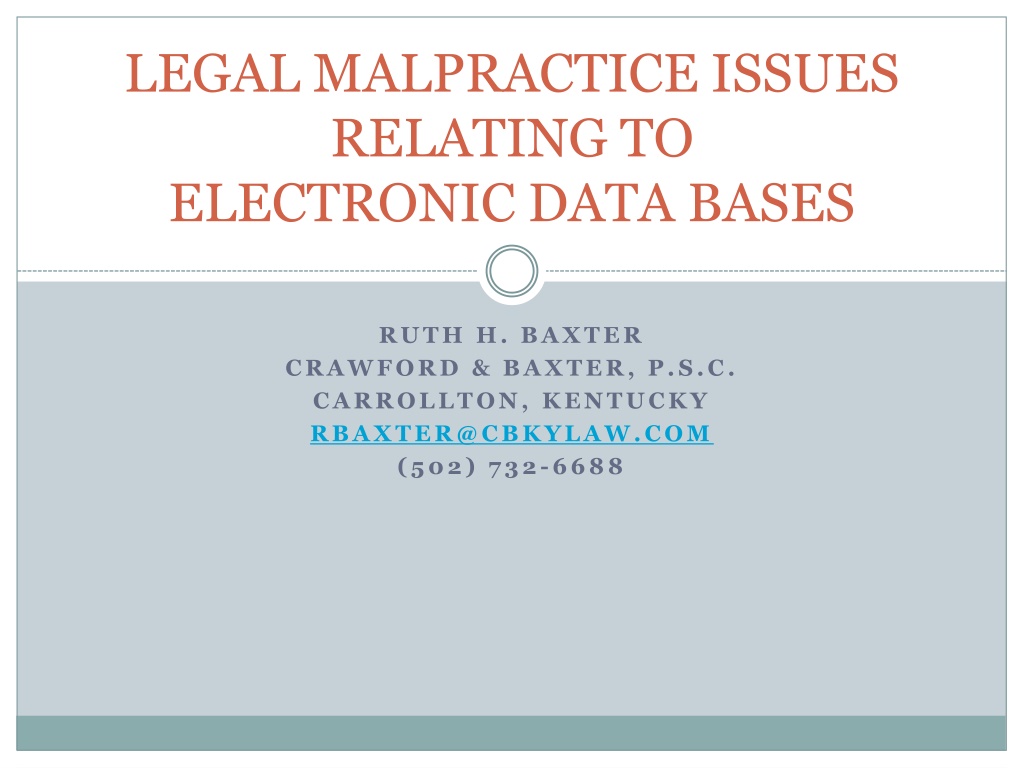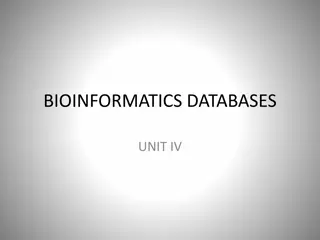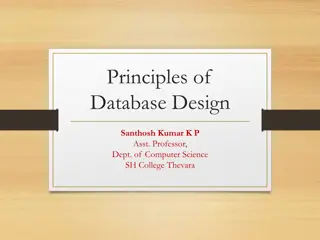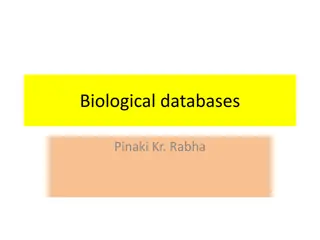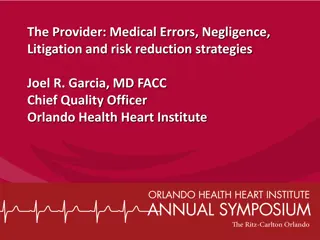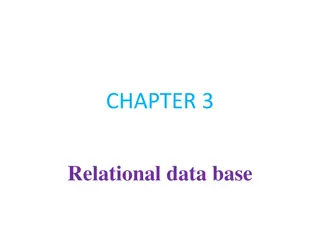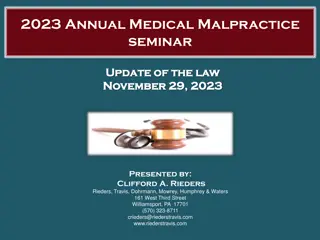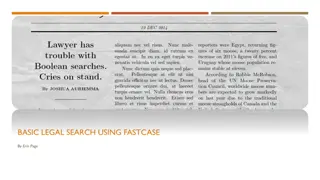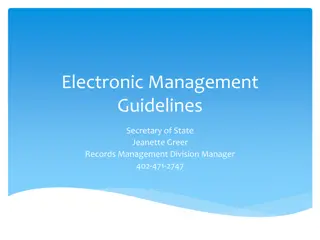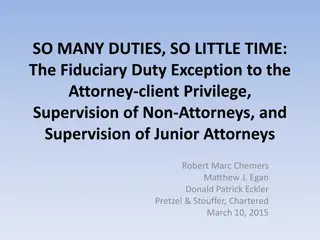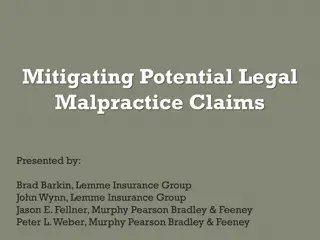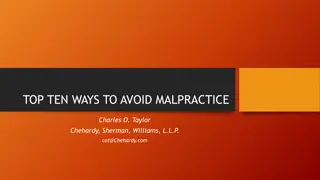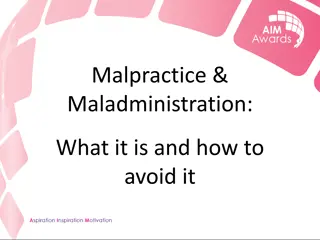Challenges and Solutions in Legal Malpractice Issues Related to Electronic Databases
The use of electronic databases in legal practices poses challenges such as document rejection reasons, recording standards, and risks like employee errors. Solutions include statutes allowing corrections and clarifications to maintain document validity. Understanding the e-filing process and typical rejection reasons are crucial for legal professionals navigating electronic data systems.
Download Presentation

Please find below an Image/Link to download the presentation.
The content on the website is provided AS IS for your information and personal use only. It may not be sold, licensed, or shared on other websites without obtaining consent from the author. Download presentation by click this link. If you encounter any issues during the download, it is possible that the publisher has removed the file from their server.
E N D
Presentation Transcript
LEGAL MALPRACTICE ISSUES RELATING TO ELECTRONIC DATA BASES RUTH H. BAXTER CRAWFORD & BAXTER, P.S.C. CARROLLTON, KENTUCKY RBAXTER@CBKYLAW.COM (502) 732-6688
Old vs. New vs. Newer Prior to the computerization of County Clerk s records, documents filed with Clerk would be hand indexed by Clerk (handwritten indexes or typed indexes) Computerized indexing implemented to allow Clerk to enter data directly on computer system for access by public, with copies of docs filed of record Updated scanning systems now allows Clerks to scan docs for both indexing and copying into system E-Filing documents still new and not routinely used
Background: Understanding the Process Persons wanting to e-file must contract with an approved vendor County Clerk s websites list approved vendors Vendors require identity of user Vendor provides software Vendor then files docs with Clerk s Software Company Clerk s Software Company sends docs to Clerk Clerk gets to review and approve or reject Rejection reason provided to e filer
Typical Reasons for Rejection of Documents Recording requirements set standards for all documents Failure to meet those standards by omitting information and/or not completing the document Example: Failure to include mailing address for tax bills; Prepared by statement not signed; Not inserting Book, Page Numbers in sources of title; Limitations on Clerk s ability to reject documents Clerk s lack of knowledge about parties, notary, etc. Fraudulent documents difficult to identify
Saving Grace statues KRS382.230 provides that a conveyance is not void if a clerk fails to properly acknowledge it KRS 382.270 states that a deed or mortgage not acknowledged or proved by law is valid if recorded KRS 382.297 allow amendments of recorded mortgage to recorded documents to correct typographical errors, or other non substantive provisions or terms by affidavit of attorney KRS 382.337 allows affidavit by party or attorney who prepared deed to provide/correct information on deed such as marital status, notary info, etc.
Five (5) Risks of Electronic Recordings Employee error in inputting information User of records not understanding process or how to access the system Security breaches such as hacking Inaccurate information being placed into system Lack of encryption protocols
Recording Issues regardless of methodology False information contained in the documents Altering information contained in the documents Fraudulent signatures Forged documents or signatures False notary statements Falsified notary statements Fraudulent or deceptive information contained in the documents filed
Attorney Liability In Kentucky Attorneys are not legally liable for every mistake in their practice Title examinations may hold attorneys to a higher degree of a duty Exercise reasonable care in searching records, acting to the best of their knowledge about information contained in those records, and having a proper degree of diligence in that search to disclose issues with the title
Negligence Claim for Attorneys title exams Negligence claims required: Duty; Breach of that Duty; Causation and Damages AND Suit within a suit : But for attorney s negligence Plaintiff would have recovered Applying that to Attorneys using County Clerk s records: Unmarketable title Defect not discovered in the exercise of reasonable care Client damaged as a result of the failure to exercise reasonable care But for attorney s negligence Plaintiff would have clear title to the property Most common real estate negligence claims against attorneys? Mortgages or liens not released Liens not perfected on titles to mobile homes or manufactured homes Liens against new purchasers not disclosed and take precedence
Attorneys limit their liability now Title opinions are addressed to requesting party (typically lender) although Supreme Court holds attorneys liable on title exams to borrowers also Title opinions limit attorney s liability to properly indexed records of the County Court Clerk Title opinions limit attorney s liability from false information on documents; fraudulent documents; forged signatures, etc. Other exclusions are standards Title insurance policies similarly exclude those risks
What negligence issues will be presented by efiling in County Court Clerk s office? Many of same issues that now exist with false documents, forged signatures, improper notary as there is no way to discern those documents are authentic Public filing must have integrity to the documents so are there safeguards in place through using vendors, or other third parties to vet filers Training for County Clerk s staff on processes, indexing, inputting data correctly, etc. Training for users on how to access information
Ways Legislature can reduce attorney negligence for efiled documents? Statutory limitations on liability for documents accepted for e filing by County Clerk that meet filing requirements Third party vendors to handle the process Penalties for filing false documents or providing inaccurate information on filed documents Retention of original documents? Who? How Long? Increase bonding requirements for County Clerks Enhance training for Clerk s Deputies On line training for users of e documents
